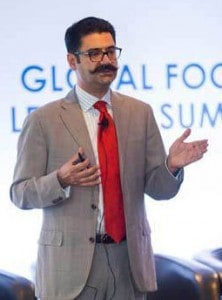
Held in the Dubai World Trade Centre during Gulfood 2013, The Global Food Leaders’ Summit was an event that generated some fascinating discussion of macro, global food issues. Tackling perhaps the most pressing and weightiest political issue in world food, Vishal Tikku, area director, Middle East & Africa for Mondelez International, used his speaking slot to highlight the need for the food industry to continue to do more with less in the future.
For Tikku, the real question is how multinationals like Mondelez can get involved at the back end of production rather than just the front. The key to that is sharing best practice, joining up efforts with government agencies and embracing the complete value chain. “Cocoa is the main ingredient of chocolate and, as the world’s largest producer of chocolate, we have a duty to make it sustainable” he said. “We are transforming and securing our agricultural supply through partnership programmes in key commodities. Our Cocoa Life programme empowers cocoa farmers, their families and communities to build better lives for themselves while making sure an adequate supply of cocoa is maintained for generations to come. Protecting subsistence farming and inspiring new generations of farming is key to ensure sustainability and instigate change in the long term.”
Cocoa Life is based on Mondelez International’s successful Cadbury Cocoa partnerships across the globe, including in India, where it has been working hands-on with farmers for 50 years.
“It is incumbent on us” said Tikku “to pass that knowledge on to our farmers too. We need to break the vicious cycle of lower income subsistence farming.” Over $400m has been pledged to the Cocoa Life Foundation over the next few years, designed to help improve conditions for 200,000 cocoa farmers and the one million people who currently live in those farming communities.
The money and education is clearly working too, says Tikku, with yields improving by over 20% where investment has been made.
Consumers, said Tikku, play a role in this cycle too, “so we are introducing products made with sustainably sourced ingredients or made with less packaging. In fact, more investment from both the public and private sector will help break the cycle of hunger and poverty in rural communities in the developing world. By addressing this broader vision we believe it is possible to achieve sustained changes in productivity, but this cannot be achieved without the co-operation, transparency and active participation of all stakeholders.”
Mondelez International knows a thing or two about shaping the future of the food industry. The company, formerly known as Kraft Foods until October 2012, is one of the world’s largest snacks companies, with global net revenues of $35bn posted last year. Employing 110,000 workers by manufacturing and marketing food and beverage products for consumers in 165 countries around the world, Mondelez has leading market shares in every category and every region of the world in which it competes, holding the No. 1 position globally in biscuits, chocolate, candy and powdered beverages as well as the No. 2 position in gum and coffee.
Tikku wanted to stress the vital part that large food organisations like Mondelez play in supporting sustainable agriculture for their products, and in continuing to invest in commodities to combat food shortages and food security issues both in the short and long term.
Food security is a particularly pertinent concern in countries like Dubai. The UAE imports 90% of the food that it consumes and, in its position as the keystone of a $9.4bn market serving the Gulf Cooperation Council (GCC) and Africa, remains challenged by issues around food security.
Worldwide, food consumption statistics are already alarming and getting worse. “Globally, resources are being consumed more quickly than they can be replenished” said Tikku.
“Nearly 40% of the earth’s land is already used for farming and approximately 70% of available freshwater is used in agriculture, but by 2050 it is estimated that the world will need 70% to 100% more food. This will be a challenge to achieve as the majority of farmers are smallholders with less than one hectare each.”
Focusing on the areas of wastage and improving low yields is key to improving the situation, says Tikku. “Crop yields are declining due to a lack of technical knowledge and financing, and climate change will increase pressure on productivity through greater frequency of extreme weather,” he said. “All of us in the cocoa sector are increasingly aware of the challenges we face in supplying this demand as increased output will have to come from improved yields rather than increased area.”
According to Tikku, food prices will inevitably increase.
“Food, currently, is cheap,” he said. “But commodity prices are correcting and will never come back to the level we had previously.”

